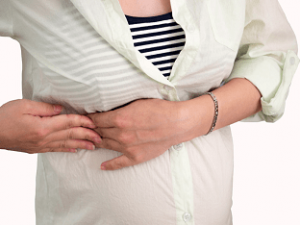 If you are in your third trimester, you probably thought you had already experienced enough pain like hip pain, backaches and ligament pain.
If you are in your third trimester, you probably thought you had already experienced enough pain like hip pain, backaches and ligament pain.
Now, you can add one more to your list, rib pain. When you start feeling short of breath, and having pains in your upper torso front and back, then you may have rib pain.
To help with your last hard period of pregnancy, detailed infromation about rib pain during pregnancy will be shared in this article.
What Causes Rib Pain During Pregnancy?
1. Bigger Uterus. The expanding uterus is the main cause of rib pain during pregnancy for making more room for the growing baby. Under such growing pressure, the muscles on the rib cage get strained more and more tightly, breathing turns much more difficult for pregnant women, some women even has a feeling of shortness in breathing. For women with a pregnancy of bigger babies, or shorter waists, there is a risk of fracture of rib in their pregnant days.
2. Changes in Hormones. The increased progesterone can lead to rib pain. The muscles and ligaments around the pelvic area and spine may turn soft with the increase of progesterone levels, preparing for giving birth, which results in a tensing feeling on the back and rib cage. This condition usually occurs at the last period of pregnancy.
3. Growing Breasts. The changes in your body make you ache all over. Don’t be surprised when your shoulders ache and your back feels like its carrying a ton of weight. This is mainly because of your ever-growing breasts. Each of your breasts may increase at least one bra size. When full of milk,they can weigh up to five pounds or more. That’s quite a lot! Imagine carrying around five to seven pound weights all the time.
4. Tension and Stress. Stress is another expected side effect of this stage in pregnancy with symptoms of hard-breathing, painful backs and shoulders, and rib pain. People just have a unique ability to create things to worry about and anxiety may show itself as physical pain.
5. Urinary Tract Infection. Urinary tract infection sometimes starts with pain in the lower abdomen, a burning feeling during urination. If not treated promptly, it will lead to infection of kidney areas.
6. Pressure in Diaphragm. When the fetus expands to chest area, a great discomfort can be felt by the stretch or reposition of fetus. Its growth and movement put pressure on your diaphragm, causing difficult breathing. So much nerves existing in the diaphragm can make you more sensitive to pains on ribs and shoulders.
How to Relieve Rib Pain During Pregnancy
1. Wear Loose Cloths. Women like to wear their regular clothes even in pregnancy. However, those cloths will become unsuitable with the pregnant days passing by. To relieve rib pain, you have to spare such restrictive and tight clothing to avoid adding pressure to your ribs. Get yourself some suitable, loose clothing for easier breath. You also need a bra. A nursing bra is optimal, which gives support but will not confine your breasts in after-birth days.
2. Lean Yourself Back. Lean back is a good posture to relieve pressure of the extra breasts weight or other parts of your body. Remind yourself to maintain a good posture. You can stretch your upper body backwards to expand the belly space and ease the rib pain and strain in lower back muscle.
3. Use Pillows to Support You at Night. If there is one tip to give any pregnant woman this is it. Invest in lots of pillows around you. Then lying down can relieve all your soreness with pillows under your lump sections, which can also ease much pressure in your body and relieves rib pain.
4. Move Around. Move around or do some mild exercise is necessary for bowel function and pain relief. The last thing you should do is become a couch potato. You may not feel like it, but you need to get moving. You can just walk around if that’s all you can tolerate. And don’t keep stand or sit for a long time.
5. Sleep on Either Side. Position can be a major factor in relieving upper back and rib pain. Sleeping on either side, usually recommending the left side or your painful side, gives you great help in pain reducing.
6. Do Some Massage. Massage is a great way to relieve rib pain. It only takes a few minutes of gentle motions to relax those strained muscles. So apply some gentle massage against the painful sections and make you relieved from the rib pain.
7. Try Cold or Warm Compress. Some women find comfort in placing ice packs on the sore ribs while others prefer warmth, like a shower or a bath. Ice bags are an easy alternative that are available in most homes. Putting ice bags on the painful ribs and elevating your arms above your head will help you a lot in rib pain relief. A warm bath will help you relax and soothe your aching muscles. Soaking yourself in warm water can relieve your discomfort. Even a quick warm shower can help with a short term relief of rib pain.
8. Use Supportive Products. There are numerous types of supportive products available. Belly bras, lumbar seat pillows, a body pillow, even a belt to support your lower body. These can reduce rib and back pain and some mothers simply won’t do without them.
When Should You Concern
Rib pain during pregnancy is commonly experienced in late pregnancy, but abnormal pain that may indicate a problem. If pain is constant and severe, you must seek help from your doctor firstly.
You’ll be happy to note that many of these pains will soon be gone. After the 36th week, the uterus drops, giving the much-needed room for relief. As the baby gets in position for delivery, the space increases more and you’ll realize that the pressure under your ribs is gone.









